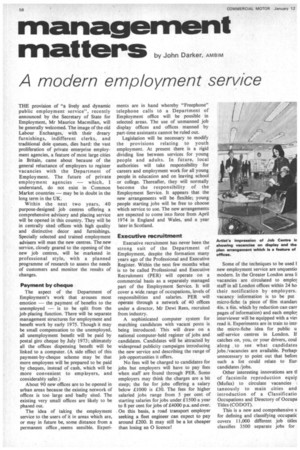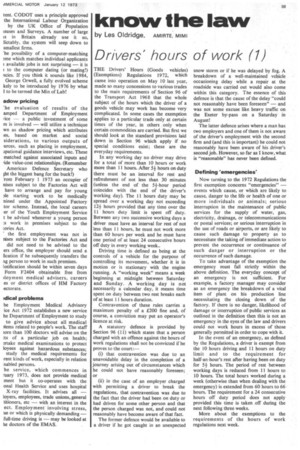management
Page 60

Page 61

If you've noticed an error in this article please click here to report it so we can fix it.
matters by John Darker, AMBIM
A modern employment service
THE provision of "a lively and dynamic public employment service", recently announced by the Secretary of State for Employment, Mr Maurice Macmillan, will be generally welcomed. The image of the old Labour Exchanges: with their dreary furnishings, indifferent clerks, and traditional dole queues, dies hard: the vast proliferation of private enterprise employment agencies, a feature of most large cities in Britain, came about because of the general reluctance of employers to register vacancies with the Department of Employment. The future of private employment agencies — which, I understand, do not exist in Common Market countries — may be in doubt in the long term in the UK.
Within the next two years, 40 purpose-designed job centres offering a comprehensive advisory and placing service will be opened in this country. They will be in centrally sited offices with high quality and distinctive decor and furnishings. Specially selected and trained employment advisers will man the new centres. The new service, closely geared to the opening of the new job centres, will be marketed in professional style, with a planned programme of research to assess the needs of customers and monitor the results of changes.
Payment by cheque The aspect of the Department of Employment's work that arouses most emotion — the payment of benefits to the unemployed — is to be split from the job-placing function. There will be separate management structures for employment and benefit work by early 1975. Though it may be small compensation to the unemployed, all unemployment benefit will be paid by postal giro cheque by July 1973; ultimately all the offices dispensing benefit will be linked to a computer. (A side effect of this payment-by-cheque scheme may be that more employees will be prepared to be paid by cheques, instead of cash, which will be more convenient to employers, and considerably safer.) About 90 new offices are to be opened in urban areas because the existing network of offices is too large and badly sited. The existing very small offices are likely to be phased out.
The idea of taking the employment service to the users of it in areas which are, or may in future be, some distance from a permanent office , seems sensible. Experi
ments are in hand whereby "Freephone" telephone calls to a Department of Employment office will be possible in selected areas. The use of unmanned job display offices and offices manned by part-time assistants cannot be ruled out.
Legislation will be necessary to modify the provisions relating to youth employment. At present there is a rigid dividing line between services for young people and adults. In future, local authorities will take responsibility for careers and employment work for all young people in education and on leaving school or college. Thereafter, they will normally become the responsibility of the Employment Service. It appears that the • new arrangements will be flexible; young people starting jobs will be free to choose which service to use. The new arrangements are expected to come into force from April 1974 in England and Wales, and a year later in Scotland.
Executive recruitment Executive recruitment has never been the strong suit of the Department of Employment, despite the formation many years ago of the Professional and Executive Register. Within the next few months what is to be called Professional and Executive Recruitment (PER) will operate on a commercial basis as a separately managed part of the Employment Service. It will cover a wide, range of occupations, levels of responsibilities and salaries. PER will operate through a network of 40 offices under a director, Mr Dewi Rees, recruited from industry.
A sophisticated computer system for matching candidates with vacant posts is being introduced: This will draw on a national computer-held register of jobs and candidates. Candidates will be attracted by widespread publicity campaigns introducing the new service and describing the range of job opportunities it offers.
No fees will be charged to candidates for jobs but employers will have to pay fees when staff are found through PER. Some employers may think the charges are a bit steep; the fee for jobs offering a salary below £1000 is £30. The fees for higher salaried jobs range from 5 per cent of starting salaries for jobs under £1500 a year to 8 per cent for jobs of £4000 p.a. and over. On this basis, a road transport employer seeking a fleet engineer can expect to pay around £200. It may still be a lot cheaper than losing an 0 licence! Some of the techniques to be used t new employment service are unquestio modern. In the Greater London area Ii vacancies are circulated to emplol staff in all London offices within 24 ho their notification by employers. vacancy information is to be put micro-fiche (a piece of film standar( 4in. x 6in. which by reduction can carr pages of information) and each emplo■ interviewer will be equipped with a viei read it. Experiments are in train to intn the micro-fiche idea for public u self-service centres in London. If catches on, you, or your drivers, coul along to see what candidates jobs /vacancies are available. Perhap: unnecessary to point out that before such a list could relate to Eun candidates /jobs.
Other interesting innovations are tl of facsimile reproduction equir (Mufax) to circulate vacancies taneou sly to main cities and introduction of a elassificatio Occupations and Directory of Occupa Titles (CODOT).
This is a new and comprehensive s for defining and classifying occupatic covers 11,000 different job titles classifies 3500 separate jobs for tent. CODOT uses a principle approved the International Labour Organization by the UK Office of Population isuses and Surveys. A number of large is in Britain already use it so, lictably, the system will seep down to smallest firms.
'he possibility of a computer-matching ;me which matches individual applicants available jobs is not surprising — it is to the computer dating (or mating!) acies. If you think it sounds like 1984, George Orwell, a fully evolved scheme kely to be introduced by 1976 by what Ito be termed the Min of Lab!
adow pricing 'he evaluation of results of the amped Department of Employment rice — a public investment of some m is involved — will utilize a technique wn as shadow pricing which attributes .es, based on market and social siderations, to various outputs of urces, such as placing in employment, ipational guidance interviews, etc. These matched against associated inputs and ride value-cost relationships. (Remember American Defence Secretary who ;ht the biggest bang for the buck!) rum February 1 1973 an occupier of nises subject to the Factories Act will have to arrange and pay for young )1e starting work to be medically nined under the Appointed Factory tor scheme. Instead, the local careers er of the Youth Employment Service t be advised whenever a young person :s work in premises subject to the tories Act.
the first employment was not in nises subject to the Factories Act and did not need to be advised to the ers office, the employer should send a ftcation if he subsequently transfers the rig person to work in such premises.
rotification should be within seven days Form F2404 obtainable free from loyment medical advisers, careers es or district offices of HM Factory .ectorate.
Idical problems he Employment Medical Advisory ice Act 1972 establishes a new service he Department of Employment to study to give advice about all medical )Iems related to people's work. The staff tore than 100 doctors will advise on the ;ts of a particular job on health; .rtake medical examinations to protect loyees against hazardous substances; study the medical requirements for rent kinds of work, especially in relation sabled persons.
he service, which commences in -uary 1973, does not provide medical ment but it co-operates with the onal Health Service and uses hospital X-ray facilities. It advises all — loyers, employees, trade unions, general titioners, etc — with an interest in the ect. Employment involving stress, ue or which is physically demanding — full-time driving is — may be looked at he doctors of the EMAS.








































































































